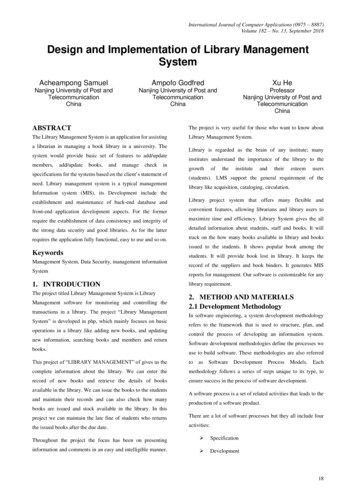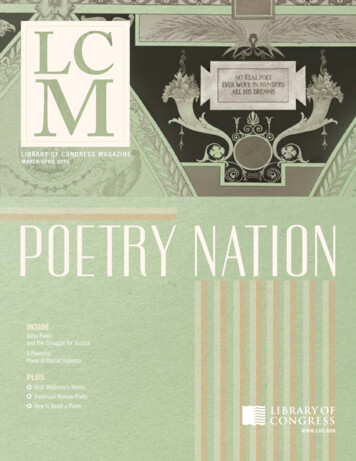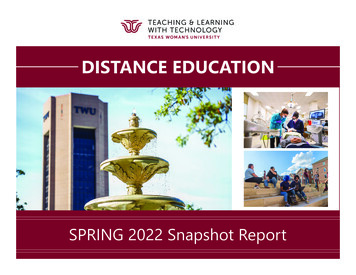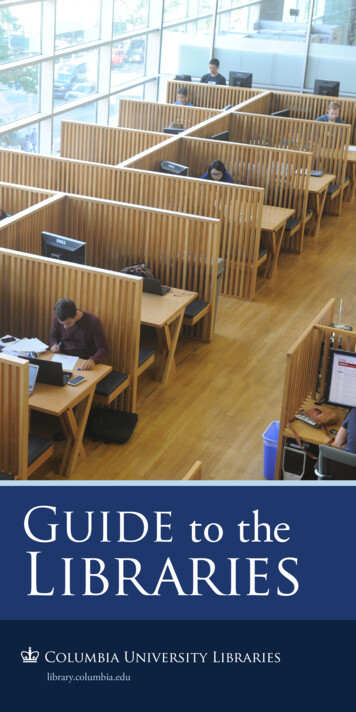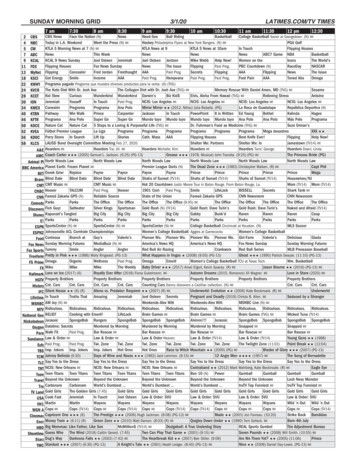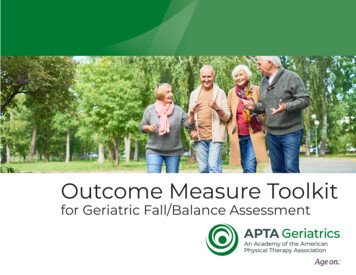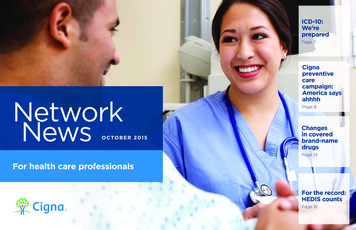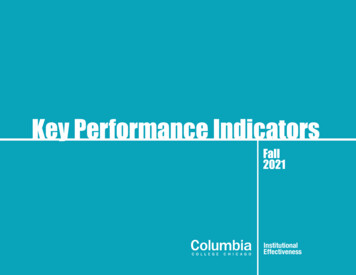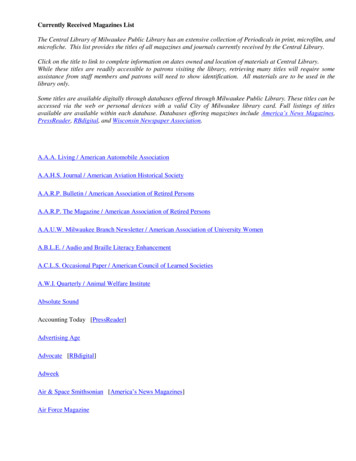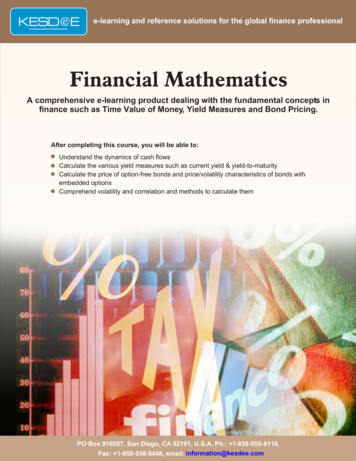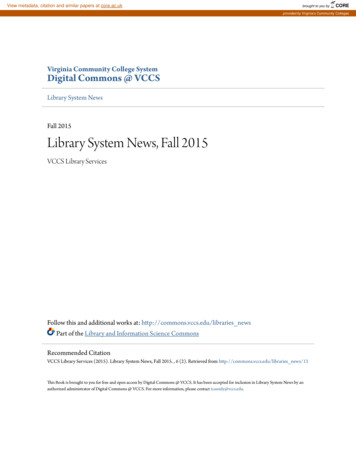
Transcription
View metadata, citation and similar papers at core.ac.ukbrought to you byCOREprovided by Virginia's Community CollegesVirginia Community College SystemDigital Commons @ VCCSLibrary System NewsFall 2015Library System News, Fall 2015VCCS Library ServicesFollow this and additional works at: http://commons.vccs.edu/libraries newsPart of the Library and Information Science CommonsRecommended CitationVCCS Library Services (2015). Library System News, Fall 2015. , 6 (2). Retrieved from http://commons.vccs.edu/libraries news/13This Book is brought to you for free and open access by Digital Commons @ VCCS. It has been accepted for inclusion in Library System News by anauthorized administrator of Digital Commons @ VCCS. For more information, please contact tcassidy@vccs.edu.
Stanley Zimny "Yellow Fall Beauty" CC BY-NC 2.0Library System NewsVolume 6 Issue 2 - Fall 2015Virginia’s Community CollegesFrom the Directorly counts a download whenthe user clicks on a givenresult link and accessesthat particular provider database. As of fall 2015, almost all of our searching isvia Primo instead of Metalibbut there was still some activity there during 2014-15.Thanksgiving is now behindus for 2015 and we are fastapproaching the Decemberbreak, so it must be time torush the newsletter so we canstill claim it is a “Fall” edition!Again this year, it took a lot oftime to put together the 201415 statistics, so here they areon page 10. I will offer a fewsummary comments on the eresource use data: The totals are down about6% in comparison to2013-14. Part of that isthe result of a decliningenrollment – about 4%.As mentioned last fall, themove from MetaLib federated search to Primo discovery for a majority ofour users has a real impact on the downloadrates. Recall that a Metalib search counts as multiple downloads from multiple databases, while a Primo meta-index search on- I made another change thisyear in that I attempted tobe more precise in separating e-book access from thearticle downloads. Therewere several cases in thepast where I couldn’t breakthose numbers out, but Iwas able to do that this year.As a result, some things that inthe past would have counted asan article download are nowcounted as an e-book access.There were over 750,000 ebooks “hits” in 2014-15, an average of 6.53 per FTES.I use the term “hits” because ofthe difference in what counts asuse among our many e-book service providers. For example,what eBrary counts as a DDAcheck-out, ProQuest Safari maycount as a chapter download.Quantifying e-resource use isIn This Issue:Reynolds Library Student Expo . . . p. 3OER at Tidewater Library . p. 4Tidewater Library Intern Program . . . p. 8Use Data, 2014-15 . . p. 10News From VIVA . . . p. 12Digital Commons @VCCS . p. 16
Page 2Library System NewsFrom the Director, continuedone way to look at library traffic, but I'dalso like to highlightan interesting discussion at the December2015 SCHEV LibraryAdvisory Committeemeeting about use oflibrary facilities.There is an assumption outside of the library community, particularly among thosewho determine funding for higher education, that library use isdeclining.A study reported atthe meeting demonstrated that over thelast 10 years, the totalvisitor count at Virginia's larger public college/university libraries has actually increased by 37%.This increase exceedswhat can be accounted for by expandingenrollment. The actualincrease is likely muchhigher, as this preliminary report was incomplete in a numberof areas. The LACplans to develop a fullreport on use of libraryspaces over the nextfew months.Lastly, as most of youknow, this will be myfinal contribution tothe Library SystemNews. If all goes asplanned, I will retire atthe end of February2016. I will have beenwith the VCCS for 20years by then and ithas been a great ride.I suspect there areonly one or two folksaround who remember when I started inJanuary 1996, but togive you an idea ofhow far we have comesince then, considerthe following:In February 1995, theyear before I joinedVCCS, the Chancellor’s Office ran a survey asking a series ofquestions of the colleges. I still havesome of the responses to that survey.Most colleges, but notall, could report thatlibrary staff had access to email. Onlyabout half had accessto the Internet, andone college reportedthat it was not veryreliable, in fact, Internet access had to beshut down during registration in order to getthe students registered.NOTIS, the librarysystem beforeALEPH, was about ayear old and most colleges could report thatthey were “on schedule” to complete theimplementation. VIVA was providing asmall set of databases, most of whichwere hosted at UVA.Access was viaacoustical modemover phone lines except for those few thathad Internet access.Finally, a few collegeswere able to reportthat they were experimenting with the newidea of offering distance learning courses that primarily usedinteractive television.(Continued on p. 16)
Vol 6 Issue 2, Fall 2015Page 3Reynolds Library Hosts First Student ExpoCheck out the onlinearchive to see theprojects in Mazhar Anik, Assistant Dean of the School of Business, and Alice Starke experience viruses in 3D.Over 200 students,faculty, and staff attended the first LibraryStudent Expo, heldApril 22 and 23 at theDowntown and Parham Road campuslibraries of J. S.Reynolds CommunityCollege.The Library StudentExpo is Reynolds Library’s spring semester showcase of students’ accomplishments completed during the school year.The library workedwith instructors to collect student assignments completed aspart of their coursework. Submissionscame from multipledisciplines, rangingfrom Biology to English to the Middle College program. Projects included artwork,posters, sculptures,and even a studentdirected video.Students enjoyed refreshments and wereimpressed with theirpeers’ work. One student remarked “Theymade this in biology? Ihave to take biology!”Another studentasked, “Can I enter mywork next year?”Dr. Susan Hunter, theDean of Nursing andAllied Health, encouraged colleagues to attend the Expo andshared her impres-sions: “I had the opportunity to stop by thelibrary and see this Expo and I was not expecting what I saw.The students’ projectswere sophisticated,professional, and creative. I think you wouldbe amazed at thedepth and breadth ofthese student work examples.”In addition to theSpring Expo, the library hosts a FallOpen House to introduce new and returning students to the library. Both events arefree; students, faculty,staff, and communitypatrons are encouraged to attend.
Page 4Library System NewsOER at Tidewater Community CollegeLibrariesContributed bySteve Litherland,Associate VicePresident for TCCLibrariesslitherland@tcc.eduTidewater Community College Librariesare actively engagedin the open educationresources (OER) community.During Open AccessWeek 2015, OER Librarians Joy Yaeger,Olivia Reinauer andAssociate VP SteveLitherland delivered aninvited presentation atOld Dominion University titled “The Zdegree and Open Educational Resources atTCC.”In attendance wereseveral ODU librariansand departmentheads. The content ofour presentation andthis overview is basedon our experience andTCC’s report: “The ‘ZDegree’: RemovingTextbook Costs as aBarrier to Student Success through an OERBased Curriculum.”In order to establish acommon understanding of the topic, weopened with a definition of OER, using thelanguage developedby the William and Flora Hewlett Foundation:“OER are teaching,learning, and researchresources that residein the public domain orhave been releasedunder an intellectualproperty license thatpermits their free useand re-purposing byothers. Open educational resources include full courses,course materials, modules, textbooks,streaming videos,tests, software, andany other tools, materials, or techniquesused to support access to knowledge.”Following this, we proceeded with an explanation of CreativeCommons (CC) licenses and how these li-censes empower content creators to sharetheir work with theOER community whileretaining copyright.We gave emphasis tothe Attribution license(CC-BY), which allowsfor the most flexibilityfor retaining, reusing,remixing, revising andredistributing OERcontent.Next we described thehistory, goals and outcomes of the TCC Zdegree program. TCCis a renowned pioneerin the field of OER, being the first college tooffer an entire degreeprogram built exclusively with OER.The two primary goalsof the Z-degree program are to reducefinancial barriers toeducational access forstudents and to empower faculty to buildcourses with OERcontent focused oncourse learning outcomes. A secondarygoal was establishedto incorporate a con-
Vol 6 Issue 2, Fall 2015OER at TCC, continuedtinuous improvementprocess into the Zdegree, taking advantage of the factthat the programcourses were completely rebuilt from thelearning outcomes.of textbooks, the Zdegree reduces thecost of an Associate’sdegree by 25%, whichgreatly reduces thefinancial barrier to educational access forour students.The high cost of textbooks presents a formidable barrier to educational access, andstudents often forgopurchasing textbooksdue to cost. As reported in the VirginianPilot, a 2013 survey ofODU students revealed that nearly20% of students attend class without thebenefit of textbooks.Over the semesterswe’ve offered the Zdegree (with no marketing), we’ve learnedthat Z-courses havehigher enrollments,lower withdrawalrates, and greater student success ratesthan traditional textbook-based courses.Students that do nothave access to coursematerials do not do aswell as those who do.Our students facecompeting financialpriorities, and sometimes late financial aidfunding, which serveto compound the barriers to access raisedby the high cost oftextbooks.An overwhelming percentage of studentssay that they wouldchoose a Z-courseover a textbookcourse, rate Z-coursequality better or thesame, and say OERcontent is an effectiveway to learn.By eliminating the costOn top of all this, weobserve that the higher retention rates in Zcourses actually increase tuition revenuefor the institution. Inother words, the students who wouldhave otherwisedropped due to nothaving access to atextbook are nowstaying in the classand paying tuition. Inthe current season ofdeclining enrollments,this is an incrediblyimportant benefit ofthe Z-degree for theinstitution.You may be thinking“Great, but whyshould the library takeon yet another initiative?” Aside from thesocial justice issue ofimproving educationalaccess, and the opportunity to supportan important institutional initiative, weargue that supportingan OER program liessquarely in severalareas of librarystrength, namely: Library expertisein supporting thePage 5
Page 6Library System NewsOER at TCC, continuedcurriculum throughcollections Library expertise insupporting studentlearning Library expertise inbuilding relationships with faculty Library expertise inInformation Literacy.The library should playa leadership role incurating excellentOER content, supporting student use ofOER, working with faculty on building OERinto their courses, andteaching our usershow to employ information literacy skillswhen using OER, because we were already experts at all ofthese activities whenOER emerged into theuniverse of informationresources. The libraries are the most capable unit in the institution for supportingthese aspects of anOER initiative.At TCC, we’ve formal-ized library support forOER through institutional policy governingthe use of OER, andby revising librarianposition descriptions toinclude a functionalresponsibility for supporting OER efforts.TCC policy 2108 “Useof Open EducationalResources” stipulatesthat librarians servethe central supportrole for faculty wishingto incorporate OERinto their courses.The policy specificallystates that: “Amongthe support providedby designated Librarians are facilitatingPathways, preparingOER LibGuides, andassisting faculty in thelocation and curationof OER content.” Pathways is a six-weekcourse covering OERfundamentals that faculty are required tocomplete prior to creating or teachingcourses for the Zdegree program.Given that TCC policyrequires libraries toprovide a great deal ofsupport for a successful program that haspromise for tremendous growth, we recognize that support forOER must be a priorityfor all librarians.Many libraries rely onone “OER Librarian” toserve the institution’sneeds. This modelmakes sense in contexts where most of thework involves advocating with stakeholdersto adopt OER. We expect student demand,Z-degree success metrics and engaged faculty to stimulate rapidgrowth of the Z-degreeprogram at TCC.Participation of all librarians in OER support will be required tomeet the demand forPathways, provide support to faculty buildingcourses, curate content, build LibGuides,support students, andso on.In order to meet thisdemand, we’ve incorporated the following
Vol 6 Issue 2, Fall 2015OER at TCC, continuedfunctional responsibilities into all campusbased librarian position descriptions:1. Collaborates withfaculty and librarians to develop andprovide servicesthat promote theeffective use ofopen educationalresources andopen content withinthe College’s curriculum.2. Maintains currentknowledge of issues in open education, open textbooks, open access, copyright,licensing and intellectual property byreviewing professional literatureand participating inprofessional meetings.TCC librarians are engaging with these responsibilities in a number of ways. Eachcampus library hasone librarian qualifiedto facilitate the Pathways course, and thisfiscal year we’ll addfour more librarians tothis group. We areconducting professional development workshops for faculty suchas OER 101 and Copyright Fundamentals.We also create focused OER resourcelists and LibGuides,and promote OERthrough faculty liaisonwork. We participatein OER conferencessuch as Open Ed,events held by OpenVA, and a recent VLAOER preconference.At TCC, we’re all OERLibrarians.Moving forward, werecognize the need forongoing support anddevelopment in a number of areas. The TCClibraries will continueto play a substantialrole in OER advocacywithin TCC, the VCCS,and through regionaland statewide events.We need to renew ourinvestments of timeand funding in OERcentered professionaldevelopment for faculty and librarians.Quality OER contentand related materialsmust be curated andshared.We will also remainmindful of balancinglibrary capacity forOER support withinthe broader range oflibrary support for institutional priorities.If you have questionsabout our efforts supporting OER at TCCLibraries, please get intouch. We’d love tohave the conversationwith you.Page 7
Page 8Library System NewsLibrary Internship Program Underway atTidewater Community CollegeContributed byJoy Yeager, LibrarianTCC-Chesapeakejyaeger@tcc.eduAt Tidewater Community College Chesapeake Campus,Library CoordinatorAbbie Basile and Research Librarian JoyYaeger have developed a new internshipprogram to equip MLSstudents or graduateswith the skills to beconfident and effectiveacademic librarians.During the Fall 2015semester, the TCCChesapeake Library ishosting its first intern,Sherry Matis. Ms. Matis is a recent MLSgraduate from RutgersUniversity, who seeksacademic library experience to complementher paraprofessionalpublic library experience.The goal of the TCCChesapeake Libraryintern program is toprovide feedbackbased, hands-on training that will help turnan intern into a professional. The library internship is a valuableexperience that requires investment onboth sides. Internswork 15-20 hours perweek in TCC's Chesapeake Library for a fullacademic semester,with the expectationthat they will conductthemselves professionally and participatein meetings, projects,and initiatives introduced at the library. Inreturn, the interns receive hands-on experience and training withproviding reference,using standard technology tools, and delivering instruction.The internship beganwith detailed referencetraining. This investment in training had ahuge payoff; our internused her knowledgeand skills to host a pop-up reference servicein the TCC Chesapeake AcademicBuilding called Libraryto Go. Students andfaculty are excited tohave a remote libraryservice on campus,and Ms. Matis provides excellent customer service on theacademic level.Her openness to learning made it easy forher to pick up newskills, such as designing LibGuides and using the GOBI collection development tool.While training in theseareas took time, thelibrary gained goodinsight into these services through her evaluative feedback.Interns are expectedto function as libraryinstructors in training,and Ms. Matis madethe most of this opportunity. ChesapeakeLibrary takes a“student teacher” approach to training onteaching practices forinformation literacy,and addresses this
Vol 6 Issue 2, Fall 2015Page 9TC Library Internship, continuedpart of the internshipin three phases:Phase 2 Phase 1 Review the outlines and syllabi forTCC General Education Competencycourses (availableonline in the college portal). Become familiar withteaching information literacythrough observation, completingtutorials and exercises with differentinstructional viewpoints.Attend TCC LibraryInstruction Teammeetings to learnabout the embedded librarian program for onlinecourses, instructionassessment analysis cycles, and additional efforts thatthe team undertakes to continuously improve instruction quality atTidewater Libraries.Conduct researchon interactivemethods of teaching and apply thatresearch to teaching small segmentsof information literacy sessions.Phase 3 Plan and teach fullinformation literacysessions for Tidewater students.For the library, instruction is understandablythe most timeintensive componentof the internship, but itcan also be the mostvaluable for both parties. In this case, theprocess of analyzingcurrent instruction atTCC Chesapeake Library in order to trainan intern on thesepractices improved thequality of instruction.In each phase of the“student teacher” approach, Ms. Matis provided ideas and feedback that helped improve the overall in-structional practicesat the library and aided the Library Instruction Team in theirwork.During Fall 2015, boththe library and our intern have taken advantage of multipleopportunities to learnand grow from eachother. Although it maybe hard to see thebenefit of investing somuch time and effortin what is typically asemester-long arrangement, helping tofoster the professionalgrowth of talented individuals is vastly rewarding in many aspects.If you have questionsabout our Library Internship program,please don’t hesitateto get in touch withus!Tidewater LibraryIntern ProgramContact:Abbie Basile,Coordinator, TCCChesapeake Libraryabasile@tcc.edu
Page 10Library System NewsE-resource Use Data, 2014-15 VCCS total use appears to decline by 6% in 2014-15, but consider three factors: declining overall enrollment, wider use of the Primo discovery tool(Quicksearch), and the ability to differentiate e-book from article use as of2014-15. Per the notes on page 1, recall that some things that would have counted asan article download from 2012-14 are now counted as distinct e-book access. In 2014-15, in addition to 2,623,891 online article downloads, VCCSsaw over 750,000 e-book “hits,” an average of 6.53 per FTES.
Vol 6 Issue 2, Fall 2015Page 11Announcing the Susan S. WoodProfessorship for Teaching ExcellenceEducation in November 2013, to honor Dr. Wood’s fortyyears of service toVirginia’s CommunityColleges.Dr. Susan S. WoodDr. Susan S. Woodretired as Vice Chancellor for AcademicServices and Research in April 2014.An endowment fundsupporting the WoodProfessorship wascreated by the Virginia Foundation forCommunity CollegeThe Susan S. WoodProfessorship forTeaching Excellencerecognizes a VCCSfaculty member whodemonstrates facultyexcellence, dedication to students, andthe academic leadership reflectedthroughout Dr.Wood’s extensivecareer.year when the professor serves, leadershipand professional development among VCCSfaculty generally (andnew faculty in particular) will be strengthened through theprofessor’s participation in key activities atmajor VCCS facultydevelopment events.Nominations for theWood Professorshipprogram must be received by 5:00 p.m. onFebruary 15, 2016,EST.During the academicInformation Literacy Tutorial CommitteeFormingAre you interested inserving on a committee to examine Connect for Success, theVCCS information literacy tutorial, in orderto identify needs for acontent / design update?The tutorial is used ina different ways by dif-ferent colleges, so thisconversation needsparticipants fromacross the system. lskinner@pvcc.edu to confirm your participation as soon as possible.We hope that you willjoin us and lend yourexpertise. Laura Skinner (PVCC Library)has agreed to chairthis committee, soplease email LauraOnce participants areconfirmed, the committee will set a conference call in spring2016.Details and onlineapplication areonline atvccs.opd.edu.
Page 12Library System NewsIntroducing VIVA’s Associate DirectorGenya O’Gara joinedthe Virtual Library ofVirginia (VIVA) as Associate Director in August, 2015.She comes to VIVAfrom James MadisonUniversity, where sheserved as Director ofCollections. In that capacity, she oversawCollection Management, Digital Collections, Special Collections, and Preservation.She has held previouspositions in CollectionManagement and Special Collections atNorth Carolina StateUniversity, and hasexperience workingwith consortia, mostrecently serving as theCo-Chair of VIVA’sMonographic TaskForce.As Associate Director,Genya will work withthe VIVA Director,Steering Committee,Library Directors, andcolleagues to implement project management plans for select-ed VIVA initiatives.She will support thework of VIVA committees and task forcesacross the memberlibraries, and collaborate on the management of VIVA’s elec-Genya O’Gara,VIVA Associate Directortronic resources, content, and applications.She will also coordinate the assessmentand evaluation of VIVAcollections and services, including thedevelopment and implementation of datacompilation systems tosupport the work ofVIVA committees.In addition, she willassist with management of consortialgrant and funding proposals.Genya received herMaster’s in Library Science from the University of North Carolinaat Chapel Hill, and herbaccalaureate degreefrom the EvergreenState College.She has written andpresented on emerging models of contentdevelopment and assessment, with a focuson academic libraries’role in scholarly publishing, digital collections, and the management of locally created materials.
Vol 6 Issue 2, Fall 2015Page 13New in 2015: Oxford Scholarship OnlineE-booksThe Virtual Library ofVirginia (VIVA) nowoffers Oxford Scholarship Online (OSO),a rapidly-growing collection of e-books fromOxford UniversityPress (OUP).OSO currently offersfull text access to800 recentlypublished titles in 20subject areas, and thisnumber will grow toover 1,000 as new titles are addedthroughout the year.It is also possible toidentify content andobtain abstracts for the13,500 books and95,000 chapters in theOSO database, whichincludes 17 additionalpartner presses. Inaddition, OSO provides links to reference works, articles,and other publicationsrelevant to topical andother searches.OSO debuted in 2003,but it offers access totitles from more than adecade earlier. Therehas been recentgrowth in many science disciplines, suchas Biology, Neuroscience, and PublicHealth & Epidemiology, with the strongestcollections overall residing in traditional humanities and socialscience disciplinessuch as Philosophy,History, Religion, andPolitical Science. TheOSO collection includes classic worksby esteemed and wellknown authors as wellas recent, awardwinning titles.The OSO platform isintuitive but is also replete with help options.The design is logicaland visually appealing- a bonus for peoplebrowsing for titles intheir areas of interestas well as for thoseseeking specific information for their research.Librarians will find it auseful tool for introducing students to thebreadth and depth ofscholarly inquiry in abroad field or targetedsubfield. The platformis robust and sophisticated enough for advanced scholars butalso easy to explorefor beginners whoneed help with relevant primary texts orreference articles.PDF downloads andprinter-friendly versions of text are alsoavailable.All pages are optimized for mobile devices, and citations areexportable to citationmanagement programs or shareable viavarious media.Oxford ScholarshipOnline is primed to bea favorite among awide range of VIVAstudents and facultylooking for high-qualityresearch publicationsin a diversity of subjectareas.VIVA PressRelease6/12/15
Page 14Library System NewsUpgrades for BioOne and IEEEThe Virtual Library ofVirginia (VIVA) ispleased to report thatBioOne has expandedmember full-text access to BioOne Complete.This expanded accessbears no additionalcost to VCCS andadds 76 additional titles in biology, ecology, zoology, conservation, and other environmental sciences.BioOne offers accessto full-text, peerreviewed journals andbulletins published byAmerican Institute ofBiological Sciencesmember societies andother closely relatedorganizations. It covers volumes from2000 forward.titles, 2800 activeand selected archivalIEEE standards, backfiles to 1872 (for selecttitles), and 3,000,000 full-text documents (anincrease from324,000 ).Equally exciting is thesubstantial new Institute of Electrical andElectronics Engineers (IEEE) content!As VIVA IEEE AllSociety PeriodicalsPackage (ASPP) subscribers, members willbe upgraded to IEEE/IET Electronic Library(IEL).IEL offers unlimited fulltext access and downloads, 6 additionaljournal titles, 1400 additional conferenceDid You Know?Presentations from recent VIVA events areavailable online!Materials from the annual Users' GroupMeeting (Oct. 215, thefirst-ever CollectionsForum (Sep. 2015),and the 17th ILL Forum (July 2015) arecollected tml
Vol 6 Issue 2, Fall 2015New Model for Wiley JournalsThe Virtual Library ofVirginia (VIVA) is upgrading the WileyOnline Library subscription to Wiley'snew “Database Model,” which includes access to all but one ofWiley’s current ejournals, The Journalof the European Economic Association.Previously, VIVA'sWiley subscriptionmodel offered accessto a collection of corejournals, and individualcolleges opted in forany additional titles.With the new databasesubscription model, allcolleges will share theWiley Database Model.This represents an increase of 217 titles toVIVA's shared, corecollection for a total of1,485 journal titles.It also means thatthere will no longerbe the annual titlereconciliation by institutions. AdvancedHealthcare MaterialsNew Horizons inAdult Education &Human ResourceDevelopment RehabilitationNursingAnatomical Sciences Education Science News Security and Communication Networks Space WeatherNew titles include butare not limited to: BiotechnologyJournal Career Development Quarterly Energy Technology Equine VeterinaryEducation Equine VeterinaryJournal Int'l Jo. of OlderPeople Nursing Int'l Jo. of Urological Nursing Jo. of EngineeringEducation Jo. of EvidenceBased Medicine Jo. of the Instituteof Brewing Mind, Brain, andEducationThe full list of journalsincluded in our Wiley“Database Model” subscription access isavailable online.Page 15
Page 16Library System NewsIntroducing Digital Commons @ VCCSberg, a Computer Artsstudent at ThomasNelson CommunityCollege.commons.vccs.edu/inquiry/Volume 19 of Inquiry:The Journal of the Virginia Community Colleges is now availableon Digital Commons@ VCCS, our newonline repository.The cover art for Inquiry v19 (picturedabove) is called Adventures in Wonderland by Kristen Kalten-Digital Commons is ahosted service frombepress. In addition toserving as Inquiry'snew home, the repository also offers accessto VCCS Annual Reports as well as Library System News.Benefits of this platform include simpleaccess and linking, anintuitive user interface,robust use data, andconnection with theworldwide user community - now, Inquiryarticles can also befound at Digital Com-mons Network / Education / Higher Education!Earlier this year, bepress launched thenoteworthy TeachingCommons OER collection: "Teaching Commons brings togetherhigh-quality open educational resources curated by librariansand their institutions.”Explore OER on thebepress TeachingCommons:teachingcommons.us/Digital Commons offers an interactive map of global readership.
Vol 6 Issue 2, Fall 2015From the Director, continued(continued from p. 2)been a part of all thatwe’ve accomplishedI ran the same surveyfrom that point toin March 1996 and notnow has been one ofmuch had changed,the great experiencexcept most of thees of my career.colleges were up onWhat has reallyNOTIS and a fewmade the last 20more had 9600 baudyears outstandingaccess to the Internet.has been the libraryOthers were still usingstaff with which Iacoustical modems onhave been privilegedphone lines. To haveto work, both withinthe VCCS and in thelarger Virginia highereducation library community.Thank you all for making these 20 years sogreat. §-Gene DamonSave the Date: 2016VCCS Library Directors Meeting, Richmond, VAJan. 08Ask VIVA WebinarJan. 12VLA Conference: Marketing Your Library, Culpeper, VAJan. 21Community College Week, VA General AssemblyJan. 25-29Digital Learning DayFeb. 17Open Education WeekMar. 07-11VCCS New Horizons, Roanoke, VAApr. 13-15Distance Library Services Conference, Pittsburgh, PAApr. 20-22VCCS OER Peer Group, Richmond, VAApr. 28-29VLA Professional Assoc. Forum, Williamsburg, VAMay 02ELUNA 2016, Oklahoma City, OKMay 03-06Innovative Library Classroom, Radford, VAMay 11-12Page 17
Virginia Community College System Digital Commons @ VCCS Library System News Fall 2015 Library System News, Fall 2015 . OER at Tidewater Community College Libraries Tidewater Communi-ty College Libraries are actively engaged . and paying tuition. In the current season of declining enrollments, this is an incredibly

